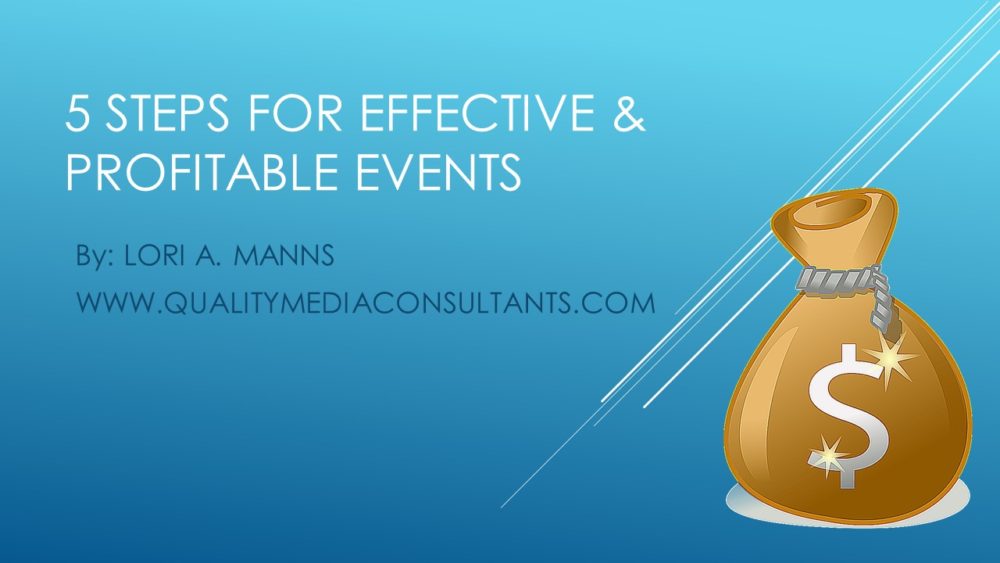
One of the best ways to grow your footprint in the marketplace is to use events as a marketing tool for your small business. There are many types of events you can hold. However, no matter what type of event it is, you will want to make sure that it is both effective and profitable. Listed below are 5 steps to help you stay on the right track when it comes to creating events that serve your target market well and prove beneficial for your small business.
- Planning – When you are hosting an event, everything must be planned from beginning to end. My suggestion is to have an event plan including the following areas:
- The Brand (event name and purpose),
- The Logistics (Location, Date, Ticket registration and agenda),
- The Marketing Plan (The method for promoting the event to the target audience),
- The Content (The educational information made available to attendees),
- The Sponsor Assets (The value offered to the sponsors for participation in the event)
- The Attendee Assets (The programs, gift bags, door prizes and other items distributed to audience)
2. Preparation – When you’re producing an event you’re responsible for the subject matter content that will be shared at your event. This material is designed to add value to the audience and give them takeaways they can use to improve their life or business in some meaningful way. Your content may be in the form of speakers giving talks, speakers participating in panel discussions, speakers conducting breakout sessions or workshops and more. The goal is simply to create a platform of distributing content and information that your audience can learn from.
When you’re preparing the content for your event, think about only the topics that your core audience cares about. Ask yourself these questions. What topic can you educate them on? How can you save them either time or money? How can you add valuable information on a topic that takes your audience’s basic knowledge of a subject to a new level?
3. Promotion – When you host an event, you’re charged with getting the word out. You must put together a marketing plan that advertises your event and attracts the right people, so you can sell tickets. The process of promoting your event starts with knowing who you are targeting. Once you know the primary target customer, you can create messages that will resonate with them and hopefully inspire them to want to attend your event.
Your promotion must include the following:
- Press release distribution
- Advertising campaign via on line mediums (Internet ads/social media)
- Promotional campaign via off line channels (business/networking events)
- Event announcement and updates to your email list
4. Presentation – The actual presentation of the event is called the execution. When the day of the event arrives, your job is to deliver the event that you promised in your advertising. No one wants to get to an event and find out that things are not the way they were advertised. Not only is that false advertising, it’s brand suicide. The best rule of thumb is to under promise and over deliver so that people will see your event as delivering more than they expected.
5. Pre-Sell – The pre-sell involves making an offer for the attendees to further engage with your brand or business in the future. You can pre-sell anything and everything. Start by thinking of the things you can offer your target market that they would be interested in down the road. How about things like: future events, memberships, training programs, etc.? The list goes on and on.
One of the best things your audience can receive as a bonus is an exclusive offer to buy from you again. Everyone knows that the easiest way to grow revenue in a business is to sell to existing customers repeatedly. At the end of your event, if you haven’t offered your attendees an “add-on” to buy from you down the road, you’re leaving money on the table.
As you can see there are many factors that go into making up a successful and profitable event. Your goal as the event producer is to ensure that your event is effective for your company as well as your attendees. A good benchmark for both you and your attendees is whether the event was a good investment of your time, money and effort as well as theirs. Make sure to get feedback from your attendees after your event so you’ll know what worked and what didn’t. Having feedback will ensure that your events keep improving.

Lori, Thank you for the information. It is very encouraging and I believe if I follow your guide, I will be successful in my business.